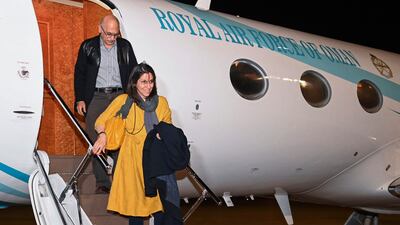When Tulip Siddiq, a UK Member of Parliament for Hampstead and Kilburn, tweeted on Tuesday that one of her constituents, Nazanin Zaghari-Ratcliffe, might be on the verge of returning home after six years of detention in Iran, she was nervous of the consequences of making the information public. She was urged to do so, however, by Ms Zaghari-Ratcliffe's husband, Richard Ratcliffe, who was confident that his relentless efforts to publicise every detail of his wife's case would be instrumental to her release. Despite the protests of the British government, which had, over the years, repeatedly asked Mr Ratcliffe to refrain from making a "song and dance", he may have been right.
For six years, Mr Ratcliffe's life has alternated between media interviews, silent vigils outside London's Iranian embassy, hunger strikes and long-distance phone calls to his wife. In that time, Ms Zaghari-Ratcliffe, a dual British-Iranian national, endured a series of trials, held in closed court rooms, on a carousel of increasingly confounding charges. She was accused first of being a spy, then a seditionist and then a propagandist. In truth, she was none of those things; Ms Zaghari-Ratcliffe, a charity worker employed in the UK, was arrested in 2016 while accompanying her young daughter on a family visit to Tehran.
On Wednesday, Ms Zaghari-Ratcliffe was released from Iranian custody and landed safely in Muscat on a Royal Oman Air Force jet, where she awaited her return to Britain. She was accompanied by another former detainee, Anoosheh Ashoori, a British-Iranian businessman. A third British-Iranian prisoner, Morad Tahbaz, was released on furlough, but remains barred from leaving Iranian soil. The proximate cause of their freedom was, in all likelihood, a deal made by British diplomats. A team of negotiators from the UK Foreign Office was in Tehran in the days before her release.
While the British government has declined to say publicly what exactly was being negotiated, the results are obvious enough. The day after Ms Zaghari-Ratcliffe's departure from Iran, British Foreign Secretary Liz Truss announced that the UK had agreed, "in parallel", to release nearly £400 million ($525m) of money it owed to Iran for a weapons deal it signed in the 1970s and subsequently reversed in the wake of the Iranian Revolution.
For decades, the British government had resisted paying the money, expressing fears that it could end up in the hands of Iran's notorious Islamic Revolutionary Guard Corps, and be used to further the regime's oppression at home and abroad. But the relentless pressure brought to bear by Mr Ratcliffe's campaign, as well as another by Mr Ashoori's family, has made that position increasingly untenable. In the time since Ms Zaghari-Ratcliffe was arrested, three British prime ministers have had to face awkward questions about her case. The current Prime Minister, Boris Johnson, has even been accused of being responsible for her prolonged detention. In a public committee hearing in 2017, when he was foreign secretary, he gaffed by casually stating that Ms Zaghari-Ratcliffe was in Iran to train journalists. That remark was used as evidence against her in one of her hearings.
When it became clear through leaks from Tehran that the £400m debt was likely linked to the fate of the detained British nationals, the UK government had few options but to pay for their release. Now, the Ratcliffe and Ashoori families' suffering has reached an end. While the wider diplomatic drama may appear to be winding down, there remains cause for concern. Mr Tahbaz, it bears repeating, remains trapped in Iran. And a fourth British-Iranian, Mehran Raouf, remains imprisoned on charges as spurious as those levelled at his compatriots.
If £400m was not enough to see all four prisoners returned home, then the UK, as well as other countries with nationals held in Iran, ought to brace for the idea that Iran’s hostage game is not over.


